The essential spices in traditional Italian sausage are fennel seed, garlic, salt, black pepper, and often red pepper flakes for hot varieties. These core ingredients create the distinctive flavor profile that defines authentic Italian sausage, with regional variations adding subtle differences across Italy.
Based on culinary traditions dating back centuries, this precise spice combination balances sweetness, savoriness, and heat to complement pork perfectly. Whether you're checking ingredients on store-bought sausage or making your own, these spices form the foundation of authentic Italian sausage flavor.
Table of Contents
- What Is Italian Sausage? Defining Authenticity
- The 5 Essential Spices in Traditional Italian Sausage
- Why These Spices Work Together: Flavor Chemistry
- Regional Variations: Sweet vs. Hot Italian Sausage Spices
- Authentic Italian Sausage Recipe: Traditional Measurements
- Buying Guide: How to Identify Authentic Italian Sausage Seasoning
- 7 Common Spice Mistakes That Ruin Italian Sausage
- Frequently Asked Questions About Italian Sausage Spices
- Conclusion: Perfecting Authentic Flavor
What Is Italian Sausage? Defining Authenticity
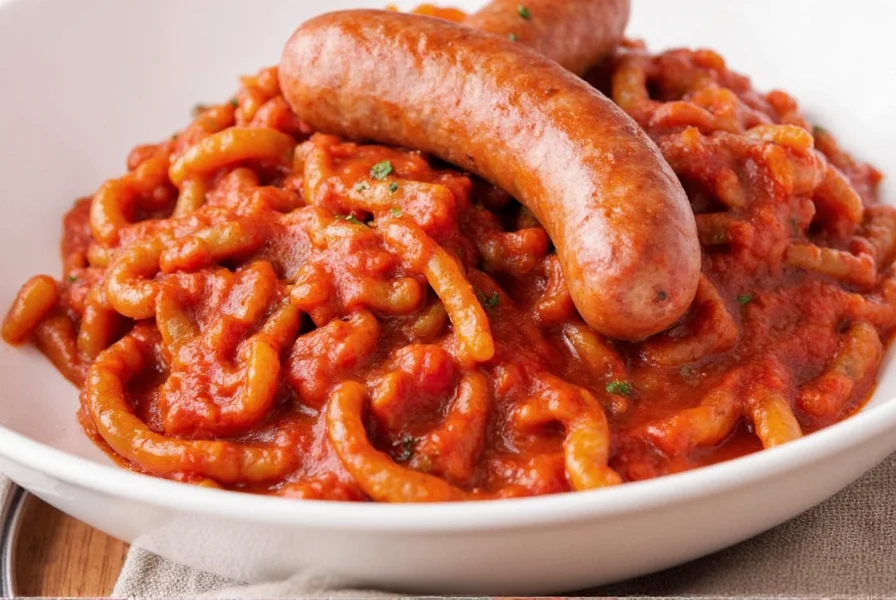
Authentic Italian sausage isn't defined by its casing or shape, but by its distinctive spice profile rooted in Italian culinary tradition. Unlike American or other international sausage varieties, true Italian sausage features a specific blend of herbs and spices that have been perfected over centuries.
According to Italian culinary experts and regional traditions, authentic Italian sausage must contain these fundamental elements:
- Fennel seed as the dominant flavor (minimum 1.5% by weight)
- Fresh garlic or high-quality garlic powder (0.7-1.2% by weight)
- Coarse sea salt for proper curing (2.5-3% by weight)
- Freshly ground black pepper (0.4-0.6% by weight)
- Crushed red pepper for hot varieties (0.2-0.8% by weight)
These precise ratios create the balanced flavor profile that distinguishes authentic Italian sausage from imitations. Many commercial versions cut corners by reducing fennel content or using inferior garlic products, resulting in a less authentic taste.
The 5 Essential Spices in Traditional Italian Sausage

While many recipes list numerous ingredients, authentic Italian sausage relies on just five core spices that work in precise harmony. Here's what makes each essential:
| Spice | Authentic Ratio (Per Pound of Pork) | Traditional Purpose | Quality Indicator |
|---|---|---|---|
| Fennel Seed | 1-1.5 tablespoons | Signature flavor base with licorice notes that cuts through pork fat | Must be whole seeds, lightly toasted and freshly ground |
| Garlic | 3-4 fresh cloves or 1 teaspoon high-quality powder | Provides savory depth without overpowering | Fresh garlic preferred; powder must be pure with no fillers |
| Salt | 18-22 grams (about 1.5 tablespoons) | Essential for flavor development and protein extraction | Coarse sea salt or kosher salt only |
| Black Pepper | 1/2-3/4 teaspoon freshly ground | Adds subtle heat and complexity | Must be freshly ground from whole peppercorns |
| Red Pepper Flakes | 1/4-1/2 teaspoon (for hot variety only) | Provides authentic southern Italian heat | Calabrian or Sicilian origin preferred |
Authentic Italian butchers emphasize that the quality of these basic ingredients matters more than adding numerous secondary spices. Many traditional Italian sausage makers use only these five ingredients for their most authentic products.
Why These Spices Work Together: Flavor Chemistry
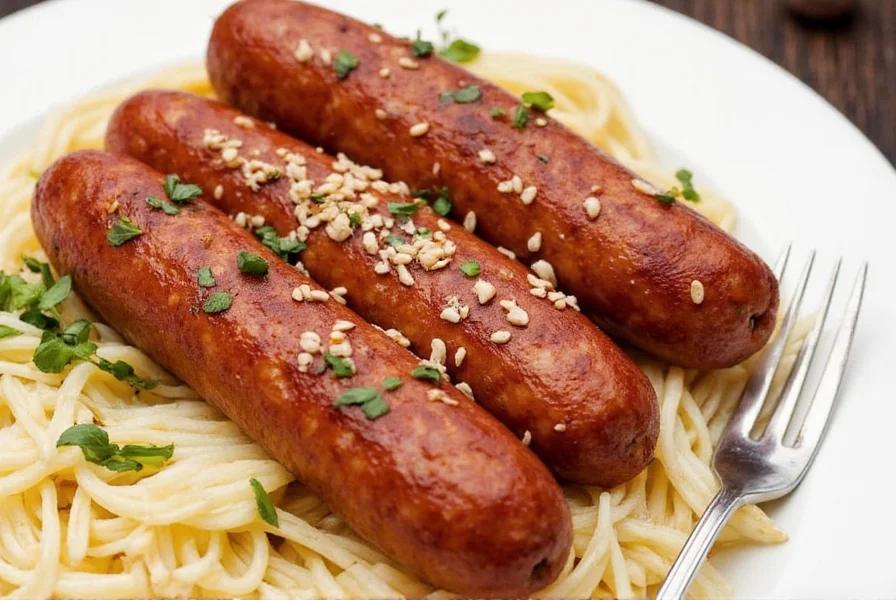
The magic of authentic Italian sausage lies in the precise chemical interaction between these five core spices and pork fat. Italian culinary scientists have studied this balance extensively:
- Fennel's anethole compound dissolves in pork fat during cooking, releasing its distinctive flavor gradually rather than all at once
- Fresh garlic's allicin reacts with salt to create compounds that enhance meat's natural umami while preventing rancidity
- Coarse salt's slow dissolution allows for proper protein extraction, creating the ideal binding for the sausage texture
- Freshly ground black pepper releases volatile oils that complement rather than compete with fennel's flavor profile
This precise chemical interaction is why authentic Italian sausage maintains its flavor integrity during cooking, unlike imitations that lose their spice character when heated.
Regional Variations: Sweet vs. Hot Italian Sausage Spices
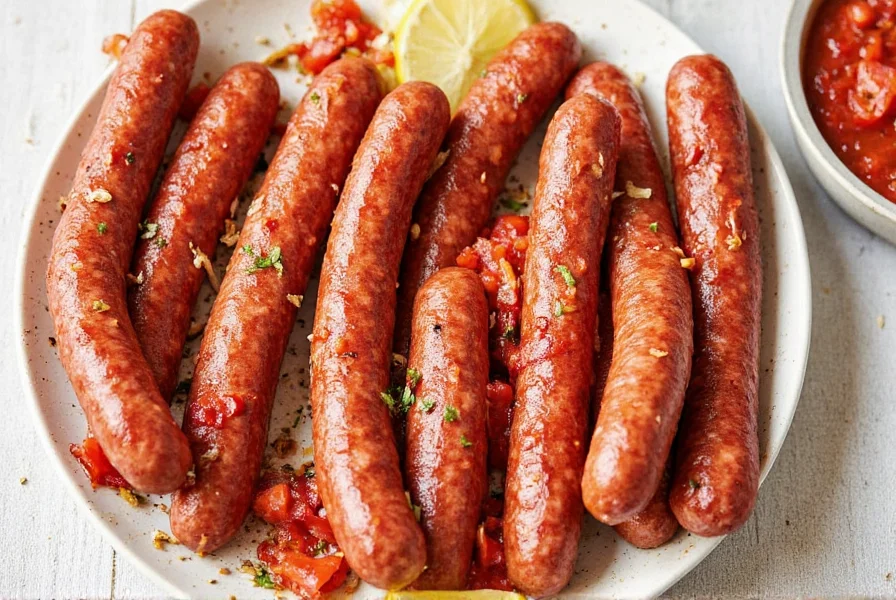
Italy's regional differences in climate, agriculture, and cultural influences created two distinct spice profiles for Italian sausage. These aren't just arbitrary preferences but reflect centuries of culinary adaptation:
| Characteristic | Sweet Italian Sausage | Hot Italian Sausage |
|---|---|---|
| Origin Region | Northern Italy (Tuscany, Emilia-Romagna) | Southern Italy (Calabria, Sicily) |
| Core Spice Ratio | Fennel (1.5tbsp), Garlic (3 cloves), Salt (1.5tbsp), Pepper (1/2tsp) | Fennel (1.2tbsp), Garlic (4 cloves), Salt (1.5tbsp), Pepper (3/4tsp), Red Pepper (1/2tsp) |
| Historical Reason | Cooler climate, less spicy food tradition | Warmer climate, needed preservation properties of chili |
| Traditional Use | Pasta sauces, risotto, mild pizza toppings | Grilled dishes, spicy tomato sauces, robust pasta dishes |
| Authenticity Check | No visible red pepper flakes | Visible red pepper flakes, deep red hue |
Understanding these regional differences helps identify authentic products. True sweet Italian sausage should have no visible red pepper, while authentic hot Italian sausage will show visible flakes and have a distinctive red tint from quality Calabrian peppers.
Authentic Italian Sausage Recipe: Traditional Measurements

Following traditional Italian methods requires precise measurements and proper technique. This recipe yields authentic flavor that matches what you'd find in Italy:
Traditional Italian Sausage Recipe (Makes 5 lbs)
- 5 lbs pork shoulder (20-25% fat content, cut into 1" cubes, chilled)
- 2.5 tablespoons whole fennel seeds (lightly toasted)
- 15 fresh garlic cloves, finely minced (or 1.5 tablespoons premium garlic powder)
- 4 tablespoons coarse sea salt
- 1.5 tablespoons freshly ground black pepper
- 1 tablespoon crushed Calabrian red pepper flakes (for hot version only)
- 1/4 cup ice-cold water or white wine
Authentic Preparation Method
- Toast fennel seeds in dry pan over medium heat for 2-3 minutes until fragrant. Cool completely, then grind to coarse consistency.
- Mix all dry ingredients thoroughly in separate bowl before adding to meat.
- Cut pork into 1-inch cubes and chill thoroughly (meat must remain cold throughout process).
- Combine meat and spices, mixing by hand for exactly 2 minutes (timing is critical for proper protein extraction).
- Add cold water or wine and mix 30 seconds more until mixture becomes slightly tacky.
- Refrigerate minimum 12 hours (24 hours preferred) before stuffing or forming patties.
- Cook to 160°F internal temperature for perfect texture and safety.
Professional Italian butchers emphasize that the 12-24 hour resting period is non-negotiable for authentic flavor development. This allows the salt to fully penetrate the meat and the spices to meld properly.
Buying Guide: How to Identify Authentic Italian Sausage Seasoning
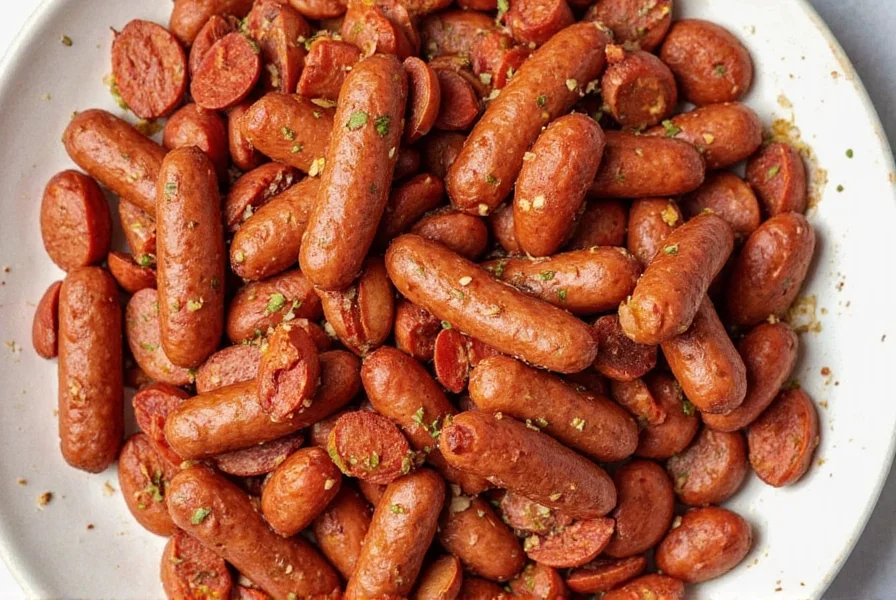
Many commercial "Italian sausage" products contain fillers and incorrect spice ratios. Here's how to identify truly authentic products:
| Product Characteristic | Authentic Product | Imitation Product |
|---|---|---|
| Ingredient List | Few ingredients (5-7 max), whole spices listed | Long ingredient list with fillers, preservatives |
| Fennel Content | Whole fennel seeds visible or clearly stated | Fennel powder or no fennel mentioned |
| Garlic Source | Fresh garlic or pure garlic powder | Garlic salt or garlic flavoring |
| Salt Type | Sea salt or kosher salt | Sodium nitrite or other curing agents |
| Color (Sweet) | Pale pink with visible fennel seeds | Uniform pink with no visible spices |
| Color (Hot) | Deep red from visible pepper flakes | Uniform pink with artificial red coloring |
When purchasing pre-made Italian sausage, always check for visible fennel seeds in sweet varieties and visible red pepper flakes in hot varieties. Authentic products won't contain artificial colors, fillers, or excessive preservatives beyond what's necessary for food safety.
7 Common Spice Mistakes That Ruin Italian Sausage
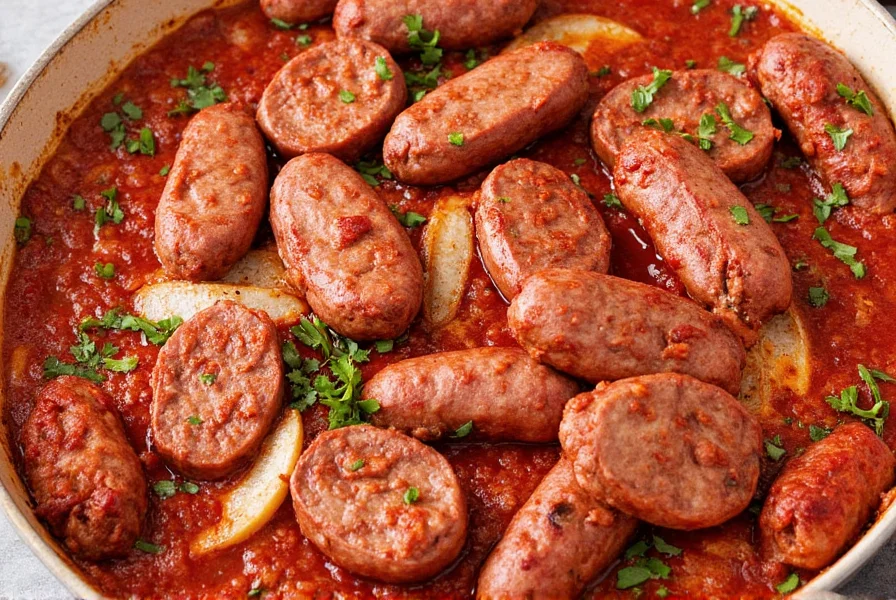
Even experienced cooks make these critical errors when preparing Italian sausage. Avoid these common mistakes to achieve authentic flavor:
The 7 Fatal Spice Errors
- Using pre-ground fennel - Freshly ground whole fennel seeds contain 3x more flavor compounds than pre-ground
- Incorrect fennel ratio - Less than 1% results in weak flavor; more than 2% creates overpowering licorice taste
- Dried garlic instead of fresh - Most dried garlic powders lack allicin content crucial for authentic flavor
- Insufficient resting time - Less than 12 hours prevents proper flavor development and protein binding
- Wrong salt measurement - Under 2% salt results in bland sausage; over 3% creates overly salty product
- Mixing too long - Over 3 minutes of mixing creates tough texture by over-developing proteins
- Using chili powder instead of flakes - Powder burns easily and creates bitter taste compared to proper flakes
Expert Correction Tips
- Toast fennel seeds at 350°F for 2 minutes before grinding for maximum flavor release
- Use kitchen scale for precise 1.8% fennel-to-meat ratio (most authentic balance)
- Add garlic during final mixing stage to preserve volatile compounds
- Chill meat and equipment to below 40°F throughout preparation process
- For perfect texture, maintain 22-25% fat content in your pork mixture
Frequently Asked Questions About Italian Sausage Spices

What are the essential spices in traditional Italian sausage?
The essential spices in traditional Italian sausage are fennel seed, garlic, salt, and black pepper. Fennel provides the signature licorice-like flavor that defines Italian sausage, while garlic adds savory depth. Salt is crucial for both flavor and meat binding, and black pepper adds complexity. For hot Italian sausage, red pepper flakes are the essential additional ingredient that provides heat. Authentic Italian sausage contains no fillers or unnecessary additives beyond these core spices.
Why is fennel so important in Italian sausage?
Fennel is the cornerstone of Italian sausage flavor. Its distinctive licorice-like, slightly sweet profile cuts through the richness of pork fat, providing balance and complexity. In traditional Italian cooking, fennel seed was abundant in certain regions and naturally paired well with pork. The aromatic compounds in fennel also help preserve the meat and enhance the overall flavor experience as the sausage cooks. Authentic Italian sausage must contain visible fennel seeds - if you can't see them, it's not traditional.
Can I make Italian sausage without red pepper flakes?
Absolutely. In fact, what Americans call "sweet Italian sausage" is the standard version without heat. Red pepper flakes are only used in "hot Italian sausage." If you prefer mild flavors or have heat sensitivity, simply omit the red pepper flakes from your recipe. The sausage will still have authentic Italian flavor from the fennel, garlic, and other seasonings. True sweet Italian sausage should contain no visible red pepper flakes whatsoever.
What's the difference between sweet and hot Italian sausage spices?
The primary difference is the addition of red pepper flakes in hot Italian sausage. Sweet Italian sausage relies on the aromatic profile of fennel, garlic, and black pepper without any significant heat. Hot Italian sausage contains all the same spices but adds crushed red pepper flakes (typically 1/4 to 1/2 teaspoon per pound of meat) for a noticeable kick. Regional traditions influence this division, with northern Italy favoring sweet versions and southern regions preferring heat. Authentic hot Italian sausage will show visible red pepper flakes and have a deep red hue.
How can I tell if store-bought Italian sausage is authentic?
Examine the ingredient list and appearance carefully. Authentic Italian sausage will have few ingredients (5-7 maximum), with whole fennel seeds visible in sweet varieties and red pepper flakes visible in hot varieties. The meat should have a natural pink color without artificial red coloring. Avoid products with fillers like breadcrumbs, corn syrup, or excessive preservatives. Authentic products typically list "pork, fennel seeds, salt, garlic, black pepper" as primary ingredients without unnecessary additives.
What's the correct fennel to meat ratio for authentic Italian sausage?
Professional Italian butchers use a precise 1.8% fennel-to-meat ratio by weight for optimal flavor balance. This translates to approximately 1.5 tablespoons of whole fennel seeds per pound of pork. Using less than 1% results in weak, inauthentic flavor, while more than 2% creates an overpowering licorice taste that dominates other flavors. For best results, toast the fennel seeds lightly before grinding and allow the mixture to rest for at least 12 hours before cooking.
Can I substitute anise for fennel in Italian sausage?
While anise has a similar licorice flavor, it's not a traditional substitute in authentic Italian sausage. Fennel has a more complex flavor profile with subtle sweetness that complements pork better than anise. Anise is significantly stronger (use only 1/3 the amount of fennel), and its flavor doesn't develop properly during the resting period that's crucial to authentic sausage making. Most Italian culinary experts consider anise an inauthentic substitution that alters the fundamental character of the sausage.
Conclusion: Perfecting Authentic Flavor

Authentic Italian sausage is defined by its precise spice balance, not by marketing claims or regional adaptations. The five essential spices—fennel seed, garlic, salt, black pepper, and optionally red pepper flakes—must be present in specific ratios to create the true Italian sausage experience.
When evaluating Italian sausage, whether homemade or store-bought, look for visible fennel seeds in sweet varieties and visible red pepper flakes in hot varieties. Avoid products with fillers, artificial colors, or imprecise spice ratios that dilute the authentic flavor profile.
By understanding these spice fundamentals and regional variations, you can consistently identify and create genuine Italian sausage that captures the essence of this beloved Italian culinary tradition. Remember: authentic flavor comes from precision, not complexity—five perfectly balanced spices beat a dozen haphazard ones every time.











 浙公网安备
33010002000092号
浙公网安备
33010002000092号 浙B2-20120091-4
浙B2-20120091-4